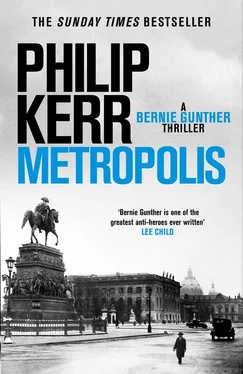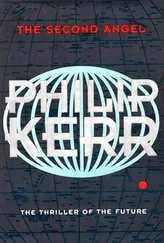‘Well, someone resented him,’ I said as we walked along.
‘I doubt that. He was a decent sort, was Kleiber. Always had a joke for you. Or a penny for some snot-nosed kid. You ask me, someone wanted to get their hands on his float. The cash he kept in his back pocket to pay up on a winning number.’
‘Sounds like you knew him reasonably well.’
‘Well enough to regret his passing. He used to give me a few coins every day to sweep up all the cigarette ends that people left on the ground under the table. He was scrupulous that way. As if his pitch really had been the red carpet at Monte.’
‘And today?’
‘I’m late today. I was on my way down to the bridge when I saw you lot fishing him out of the water.’
‘By the way, not that it’s any of my business, but that scar on your head. How did you get it?’
She fingered the scar without any sign of discomfort. ‘This? I was lucky. That’s how I got it. I was a nurse on the Eastern Front in 1916 with a Catholic confessional sisterhood. Got hit by a piece of shrapnel from a Russian shell. Same piece of shrapnel that killed my sister, who was also a nurse. I was lucky once, and I might just get lucky again.’
‘Sorry. It’s just that you don’t see many female war veterans on the streets.’
‘That’s because most of us who were injured died. Women were less important than men.’
‘Must be something a man said.’
Under the Gertrauden Bridge, chained to a mooring ring, we found what looked like a folded-up billboard of the kind a sandwich man might have carried. It was about four feet in length, painted green and quite heavy. I took out my knife, twisted the point in the padlock, and a minute later we were unfolding a trestle table about eight feet long that was squared off in numbers and combinations of numbers; in the middle was a sunken round dish with ten crude round slots numbered from zero to nine. The operation was fairly obvious. The croupier would spin the wooden ball around the dish, wait for the ball to drop onto a slot, and then reckon up the game’s losers and winners.
‘Kleiber was quick at making calculations and he never got it wrong. Had a mind like a slide rule.’
‘That float,’ I said. ‘How much cash did he carry, do you think?’
‘Maybe a hundred marks. Enough to make it worth someone’s while to rob the poor bastard.’
‘Anyone spring to mind?’
‘No one from Cölln. Folk around here are tough but honest, in the main. Some mad bastard from somewhere else, probably. Whole country has gone mad, if you ask me. Fact is, there used to be a madhouse nearby, but they closed it. Seems to me as if we need our madhouses more than ever.’
‘You got that right. But with all that money you’d have thought he had a human watchdog.’
‘He did. Ex-boxer. Corduroy suit. Matching cap. Tall fellow with an ear like someone’s kidney on toast. What was his name? Kube. Kolbe?’
‘I wonder if he barked or not.’ I fetched a roll-up from a tin and lit it quickly. ‘And if not, why not? Where did Kleiber live?’
‘No idea, lad. But every day, after the game, regular as clockwork, he’d go to the Nussbaum Inn on Fischerstrasse and have his lunch there. They might know. In fact, I’m sure of it.’
We walked back to the crime scene and I waved Miczek over; I wanted him to hear me as I dictated to Frau Künstler through the rear window of the murder wagon. Without looking up, she typed on a sleek black Torpedo that was the same colour as the lacquer on her fingernails. That was the first time I realized our stenographer was a much younger woman than I’d supposed; younger and more unconventional perhaps. On the back of her head she wore a little black beret, while on the shoulder of her black dress was a brooch shaped like a large black grasshopper. What with her white face and heavy black eye make-up, she resembled Theda Bara. Meanwhile, Hans Gross was taking pictures under the arc lamps, using the Folmer & Schwing now. While I was there a call came through on the radio from the Alex; it was Gennat. I told him what I knew, and when he’d gone off the air, I told Miczek and one of the other uniformed coppers to accompany me to the Nussbaum Inn.
‘Do you know the place?’ I asked Miczek.
‘Everyone on the island knows the Nussbaum. Oldest bar in Berlin. And five minutes’ walk from here. But they don’t much like coppers in there. Especially on payday.’
‘Good. That suits me just fine.’
‘It might be a good idea to call for some backup.’
‘We won’t need it.’
When we got to the Nussbaum, I told the two cops to wait outside front and back while I went in to ask questions.
‘Are you sure about this, lad? There are some tough Fritzes in there. And likely most of them are drunk.’
‘If anyone comes out in a hurry, I want you to stop them leaving. Just so I can get a look at them. You never know. My guess is that Kleiber’s murderer waited until his man had finished lunch and then followed him out, so maybe his killer is still on the grounds.’
‘All right, lad. I see what you’re driving at. But be careful. No sense in you getting yourself murdered today.’
The Nussbaum had been at 21 Fischerstrasse since 1505 or 1705 depending on who told you the story. It was every American tourist’s idea of what an old Berlin bar should look like; it had a tall saddlebag dormer roof that was a little wonky and the kind of windows that made you think the place belonged properly in a fairy tale involving a witch with a very long nose. There was a ramshackle garden out front that was mostly one lime tree, and a green picket fence next to which stood a line of ragged children who were probably waiting for their parents to finish drinking away their wages in the bar. From ten feet away you could smell the beer and hear the raucous laughter of men and women who’d already had far too much to drink. And as I walked through the front door I tried to banish my nerves to the deepest pocket of my trousers.
At the bar I picked up a glass and tapped it loudly with a knife. ‘Could I have your attention, please?’
Gradually the noise died down.
‘I’m a detective from the Alex—’
Several people booed and catcalled. The usual friendly Berlin welcome.
‘And I’m investigating the murder of a man who came in here every day. His name was Bruno Kleiber and he ran an illegal roulette wheel under Gertrauden Bridge. Someone robbed him this afternoon. Stabbed him to death and pushed his body into the Spree. I’d like to speak to anyone who saw him today or who can shed some light on what happened to him.’
‘He was a Jew,’ someone called out. ‘So who gives a damn? Maybe someone just did to him what he used to do to other people.’
‘Yes, rob them,’ said someone else, laughing.
‘I don’t believe that. According to what I’ve heard he ran a straight game.’
‘He was in here today,’ said the man nearest to me. ‘Same as always. Had his lunch and a beer and then left.’
‘What time was that?’
‘Came in about twelve. Left about two. Must have happened after that.’
‘Did you see him talk to anyone?’
‘He kept himself to himself,’ said another man. ‘Never bothered anyone.’
The publican came around the counter with a small billy club in his hand. ‘Dead, you say? That’s too bad. Bruno Kleiber was a good customer and a good man and I’ll bar any one of you bastards who says different. Got that?’
The noise died down again.
‘I’m at the Alex if anyone remembers anything, and you can telephone me in confidence. The name’s Gunther. Bernhard Gunther.’
It wasn’t my most subtle performance, but then it wasn’t meant to be. My intention had been to behave exactly like a loud yapping dog, and hopefully to drive some sheep into my pen.
Читать дальше












